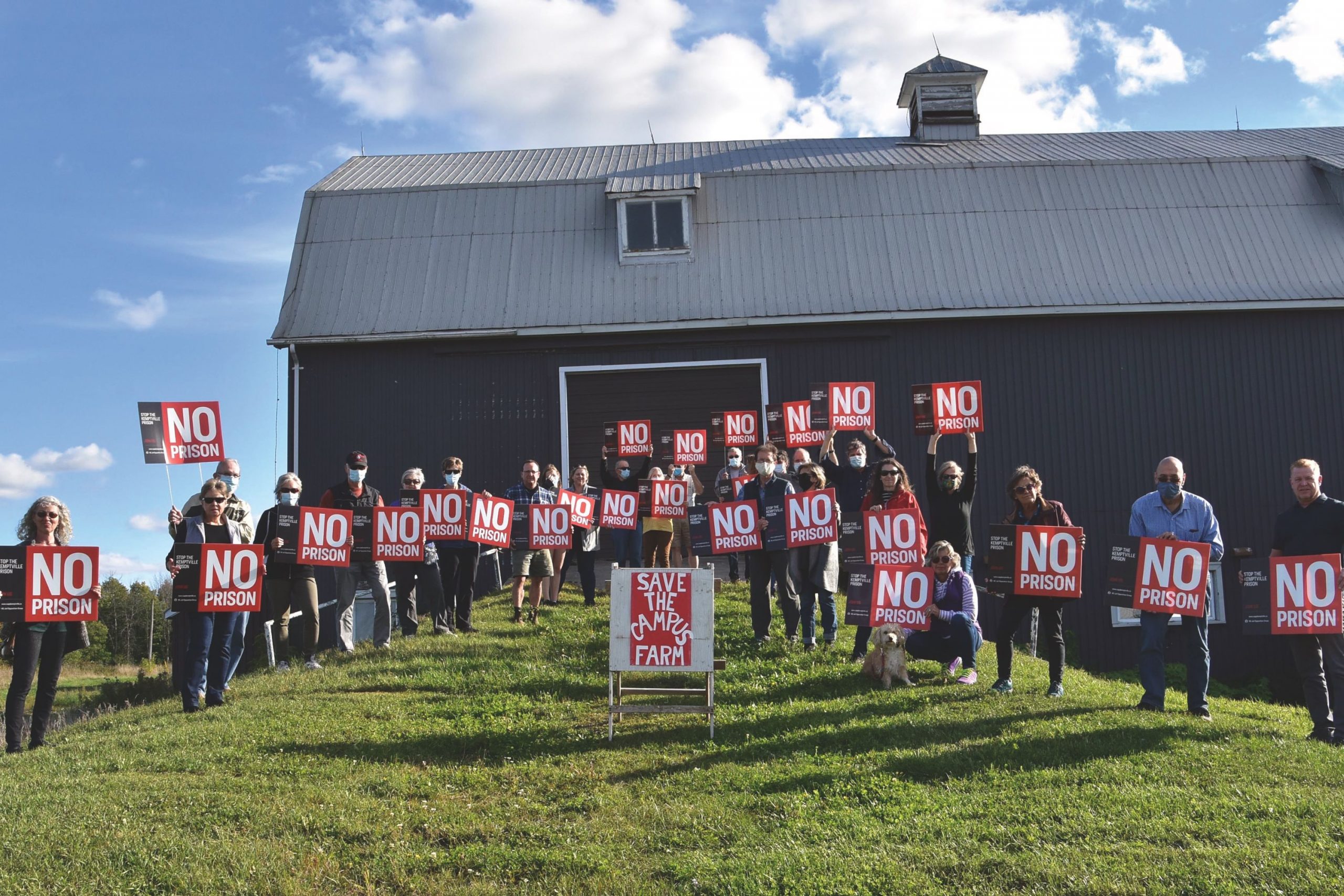On a cool, cloudy afternoon in June 2022 in the rural community of Kemptville, Ont., a crowd of around 30 local residents gathered at the windswept grounds of the former Kemptville Agricultural School. A red and green placard, hung behind a makeshift stage under the eaves of an old barn, proclaimed in bold block letters: “NO PRISON. SAVE FARMLAND.” The crowd, which skewed middle-aged and retired, shared a common goal: stopping the Ontario government from building a new jail on the grassy lands.
“If this gets covered up with pavement, and the buildings are gone — pretty difficult to reverse that,” said farmer and reeve of Montague township Bill Dobson. “We must protect our natural, historical and material heritage.”
Residents from Kemptville and its surrounding areas have been protesting Ontario Premier Doug Ford’s plan to build a new 235-bed facility — the Eastern Ontario Correctional Complex — in the community since it was first announced in August 2020. While some in Kemptville initially welcomed the promised economic benefits of a new institution, concerns later emerged around the loss of farmland. Over the next couple of years, however, the original goals of many community members who opposed the jail’s construction have changed. Their actions are no longer aimed at stopping a new jail from being built in Kemptville — they believe no new prisons should be built in Ontario, period.
The province claims that “this is going to be good for the community,” says environmentalist and local businessperson Paul Cormier. “There’s no prison that’s good for any community. It just doesn’t work that way.”
The proposed site for the Eastern Ontario Correctional Complex is an almost 74-hectare piece of land in the southeast corner of Kemptville, a few minutes’ walk from the picturesque downtown, and bordered to the east by Highway 416, which runs from the St. Lawrence River up to Ottawa. Today, the site is home to a few barns and mostly unused buildings — the remains of the once-legendary Kemptville Agricultural School, which opened in 1919 and became a University of Guelph satellite campus in 1997. For nearly 100 years, the site churned out farming graduates who brought what they learned back to their home communities across the province.
The school finally closed in 2015 when the University of Guelph shut down the campus due to low enrolment and high costs. North Grenville, the municipality in which Kemptville lies, purchased a large part of the lands for a community centre, but the remaining hectares stayed under the province’s ownership. According to Cormier, who has worked in agriculture, the property as it stands now isn’t exactly what you’d call “prime” farmland. “The land may not yield high-quality crops,” he says, “but still has agricultural potential” for livestock operations and other uses.

In 2016, the Census of Agriculture, which gathers information on agricultural activities across Canada, revealed that Ontario was losing an average of 71 hectares of farmland each day. It was a deeply concerning statistic, especially since once farmland is developed for non-agricultural uses, chances are virtually zero that the soil can ever be regenerated. By the 2021 census, that figure had nearly doubled to 129 hectares lost per day.
Amanda Wilson, an assistant professor in the school of social innovation at Saint Paul University in Ottawa, researched this trend. According to a piece she wrote for the Ottawa Citizen, Ontario lost 2,350 farms and 4,000 farmers between 2011 and 2016. In 2021, the average age of farmers in the province was over 55, and most young people looking to join the field cannot afford the expensive equipment and land, she wrote. As a result, Ontario is poised to have fewer and fewer farmers over the coming decades — just as climate crisis experts warn of impending food system collapses alongside environmental catastrophe.
While it might not be particularly suitable for crops, this parcel of land — which the province owns — has attracted agricultural interest. For example, a few years ago, Cormier pitched an agro-environmental research centre to be built on the grounds. He had spent years in research and development at Agriculture Canada and knew that, as the climate crisis bears down on unprepared communities, alternatives to a shaky global food supply chain and unsustainable commercial farming methods will be needed. The project never came to fruition, but “new ideas in agriculture, coupled now with the environment, is something worthy of pursuing,” he says.
The Kemptville grounds receded from the public eye until the afternoon of Aug. 27, 2020. That’s when Doug Ford, along with Conservative MPP Steve Clark and the mayors of Brockville, Elizabethtown-Kitley and North Grenville hosted a press conference to announce the construction of two new jails. One was slated for Brockville. The other, the Eastern Ontario Correctional Complex, was destined for Kemptville.
The news was a shock to locals, who hadn’t been consulted on the project. Kirk Albert was one of them. He has spent his whole life in the North Grenville area and now has a young family. He worried about the impact of a 235-bed jail facility on Kemptville’s small hospital. Albert’s taxes have gone into the hospital, and he wondered if his children would still be able to get the service they needed in case emergencies.
Albert began talking with his neighbours, many of whom expressed their own frustrations. Within a week, an ad-hoc group was formed, which solidified into the Jail Opposition Group (JOG). Their focus was to extract information from the Ministry of the Solicitor General, which oversees prisons and jails in the province. Why had they settled on Kemptville? What would the impacts be?
Other provincial corrections institutions are located in urban areas, better equipped to absorb infrastructure demands and offer social supports that prisoners and their families would require. Virtually all of the people incarcerated at the new jail would be coming from away. How would their families and friends get to Kemptville? Albert was mystified by the decision. “We don’t have a transit system; we don’t have a taxi service; we don’t have supports like the John Howard Society or Elizabeth Fry,” he says. “How are they going to get inmates to their court dates? When they get discharged, where are they going to go?”
Albert wasn’t the only local person moved to action. Victor Lachance and his wife had relocated to Kemptville from Ottawa in 2018 to downsize. To the retired public health worker, it was unconscionable that MPP Steve Clark, his provincial representative, hadn’t spoken to constituents about such a large project. After all, the massive development came with a price tag of up to $499 million for construction and a minimum three-year timeline until completion.
About two months after the provincial government’s announcement in late August 2020, Lachance and his cohort of residents created the Coalition Against the Proposed Prison (CAPP). The idea was to create a platform where people could find information about the proposed prison and form their own opinions. The group started sharing stories, research and videos for locals to skim while organizing rallies and events to discuss the prison.
Together, JOG and CAPP, which count around 300 members between them, began a joint campaign to slow the construction of the proposed prison until key questions were answered. Since Clark and the solicitor general’s office failed to respond to their questions, Albert and Lachance started reaching out to experts and academics and asking them to share their knowledge with the group. They hosted Zoom forums with farmers and agriculture industry experts.
Before long, their research led them to Justin Piché, an associate professor in the University of Ottawa’s department of criminology. The two had read an op-ed that Piché co-wrote for the Ottawa Citizen decrying the proposed prison. But Piché’s arguments were far different from Albert’s and Lachance’s original opposition — and had nothing to do with farming either.
Piché is a prison abolitionist. He co-founded the Criminalization and Punishment Education Project in Ottawa in 2012 to research and organize around Canada’s criminal justice system, including advocating for prisoners at the Ottawa-Carleton Detention Centre and working to stop new jails from being built in the Ottawa area.
Piché’s first meetings with CAPP consisted of educational conversations. He shared figures on the province’s skyrocketing use of pre-trial detention, a policy that holds people in jails before they’ve had their day in court. Piché explained that in 1980, 30 percent of people in provincial and territorial prisons across Canada were waiting for trial. Today in Ontario, that number has ballooned to 60 percent, the vast majority of whom are not accused of violent crimes. Instead, they are people who are unhoused, living with mental health and drug use issues, and unable to secure bail or get sureties.
His colleagues call it a “culture of adjournment,” where cases are continually postponed and the accused are stuck in jail indefinitely. “Rather than address the various pathways that push people to the margins and into prisons, whether we’re talking about housing, community-based mental health, harm reduction, drug treatment, ramping up spending in education and early intervention for youth, we have a push to build new prisons,” says Piché. “We’re talking about an approach that is the most costly, the least effective, the most manifestly unjust and inhumane.”
Piché and Capp have been meeting regularly together for the past two years. Organizing in Kemptville is a little different than in Ottawa. While Ottawa is a Liberal stronghold, the riding of Leeds-Grenville-Thousand Islands and Rideau Lakes is a Conservative bastion that has only elected another party three times since 1867.
Like the majority of Canadians, few people — if any — in the community of 4,000 considered themselves prison justice advocates. Yet, over the course of the past two years, thanks to input from Piché and tales from people who have survived prisons in Ontario, that has changed.
“There are so many more aspects to this than, ‘Can our hospital deal with the issues they will inevitably encounter?’” says Albert. He notes the high percentage of people in Ontario prisons who are on remand — either in custody or out on bail awaiting trial. “[The province is] taking half a billion dollars and putting it into something that seemingly is not working, as opposed to trying to address root causes.”
Lachance, too, has come a long way. “I’m not an abolitionist, but I don’t think we need any new prisons,” he says. “I think we need to stop mass incarcerating Indigenous people, people of colour and people with mental illness and addictions.” These are not the average talking points of a retired Canadian in a rural, Conservative township. So how did these budding campaigners, local business owners and farmers end up on the same side of the table as prison abolitionists? For Lachance, common ground developed from a sense of injustice.
Another abolitionist group raising awareness around the struggle in Kemptville is Escaping Tomorrow’s Cages (ETC), a collective of friends in southern Ontario who have been organizing around prison issues for 10 years. ETC member Camille Desplaines — who uses a pseudonym due to past attacks from the far-right — says that ETC aims to communicate just how damaging the prisons in our societies really are. “Prison really just spews additional problems out of both ends,” notes Desplaines, who says she was incarcerated in provincial facilities five times throughout the 2010s. “It produces these kinds of very traumatized, very violent and cynical ways of being, and exports them back out into people’s home communities.”
The proposed Kemptville and Brockville facilities are just one piece of a province-wide expansion of prison infrastructure. ETC notes that existing jails in Kenora and Thunder Bay are currently being expanded, while a new, larger prison in the latter is expected to be completed in 2026. In eastern Ontario, the province is expanding capacity at jails in both Brockville and Napanee.
Prison justice activists say that this is merely the latest wave of prison expansion in the province, matched over the decades by similar endeavours, which also promised to solve or otherwise remedy problems in Ontario prisons. The Toronto South Detention Centre (TSDC), for example, opened in 2014 and absorbed inmates from three older jails. At the time, it was touted as a more humane and progressive facility that would relieve overcrowding and poor conditions.
Yet, in 2017, a Toronto Life investigative article called it a “$1-billion hellhole.” In its first two years, four people died and another 14 attempted suicide, according to the article’s author, Raizel Robin. Management often instituted lockdowns in response to staff shortages, during which people were forced to remain in their cells for days without access to showers, phone calls or exercise. In a January 2020 ruling on an inmate’s sentence, Andras Schreck, a judge of the Ontario Superior Court of Justice, called the conditions “inhumane” and accused Doug Ford’s government of “deliberate state misconduct.”
He didn’t stop there. Referencing 14 separate rulings from colleagues since 2015, Schreck described TSDC as “unacceptable, shocking, deplorable, harsh, oppressive, degrading, disheartening, appalling, Dickensian, regressive, and inexcusable.” Two other judges saw fit to reduce sentences for two inmates based on their experiences at the jail.
The Kemptville announcement was accompanied by the same progressive rhetoric as the TSDC promises. But the province, wrote Piché and his colleague Aaron Doyle in their Ottawa Citizen op-ed, failed to provide evidence for its claims and “largely [repeated] the same broken promises.” Ford’s announcement also relied on a vague claim of “economic recovery” for the region. MPP Steve Clark and the Ministry of the Solicitor General both declined Broadview’s interview requests but sent statements reiterating the benefits the prison would bring.
Desplaines says that other campaigns to stop prison construction have led to impactful long-term organizing groups. The Toronto Prisoners’ Rights Project, she points out, grew out of a campaign to oppose the construction of the Toronto South Detention Centre. But there have been no successful efforts to stop a prison from being built. “For us to really succeed, it needs to not be built at all, not just have its location changed,” she says.
At the June 2022 rally in Kemptville, Laureen St. Amour, clad in a grey cardigan and a black T-shirt that read “Build Communities, Not Jails,” stepped up to the microphone. She told the story of her son, Justin, who died after hanging himself in his cell at the Ottawa-Carleton Detention Centre. Justin had checked himself into an Ottawa hospital, stating that he was schizophrenic and likely to kill himself. He desperately wanted help, but the doctors dismissed him. When he threatened his Ontario Disability Support Program worker, hospital staff called the police, who booked Justin into Ottawa-Carleton.
More on Broadview:
After he was taken off suicide watch, he hanged himself in the jail and died later in hospital. “And yet,” said St. Amour, her voice impassioned and strained, “we want to spend $500 million on a new jail. How is that fixing the problems?”
Intense political division in recent years has made common organizing among politically disparate groups seem impossible, and social media’s favouring of outrage over nuance has even positioned it as undesirable for progressives. But like Lachance and Albert, Desplaines says that their work requires different approaches, as big groups are susceptible to infighting and can lose sight of their goals: “We emphasize that decentralization is important, because that’s what makes it possible for people to go down their own path and fight for their own reasons.”
Two months after announcing its plans for the Kemptville prison, the province finally held a virtual public information session. Afterwards, residents were left with more questions than answers. The government touted the Kemptville lands as uniquely suitable for the project, but JOG and CAPP looked at the other locations considered and found that even according to the province’s criteria, Kemptville ranked far lower than other spots. Facts and figures in the government’s presentation about employment opportunities and economic development didn’t add up either.
So on Aug. 15, 2022, Lachance and Albert stood together in downtown Ottawa to announce a new step in their offensive: they were taking the province to court to stop the prison. They organized a press conference where they filed an application for a judicial review of the province’s plan.


Their lawyer, Stéphane Émard-Chabot, laid out their key arguments. First, in building the prison, the province was contradicting the Provincial Policy Statement, 2020 of the Planning Act, a cabinet-approved document that lays out rules for managing natural resources in Ontario. Secondly, since all ministerial decisions must “have regard for” local planning policies, and North Grenville’s protects designated farmlands, the unilateral decision to build a prison was illegitimate. And finally, Lachance and Albert noted that the Planning Act required the province to consult with communities impacted by their decision-making, but no consultation occurred before the announcement was made back in August 2020.
The province responded by filing a motion to dismiss on the grounds that Albert and Lachance’s judicial review request was invalid and would add unnecessary time to the building process. Back in July 2020, the Ford Conservatives passed new legislation requiring any judicial reviews of provincial decision-making to be filed within 30 days of the related public announcement. But the government didn’t hold a public information session about the decision to build in Kemptville until Oct. 30, more than two months after the announcement.
“How is it conceivable we would ever have enough information that we could consider a judicial review within a 30-day period when, despite our efforts to get information, none was released?” asks Albert. He and Lachance have responded to the motion to dismiss, demanding that the government answer their inquiries.
“This is not at all how I expected to spend my retirement,” Lachance chuckles. He says the legal challenge is going to cost both of them money that they don’t have, but their GoFundMe campaign, which has raised $20,000, could help bridge the financial gaps.
Albert says that their request for a judicial review demonstrates their commitment to what they have learned about prison systems over the past two years. In the meantime, the pair continue to raise awareness through CAPP and JOG about the shortcomings of Ontario’s plan. They have a group of people behind them as they take on this next fight: neighbours, farmers, environmentalists and, yes, prison abolitionists. They have allies in Paul Cormier, Amanda Wilson, Justin Piché and Camille Desplaines — people with vastly different experiences, brought together to fight against the new jail.
For Lachance, this coalition, which ranges in age, interest and political affiliation, is the biggest strength of their struggle in Kemptville. “You know, there’s far more power outside of one small group of people,” he says. “There’s always a lot more knowledge and experience that people can contribute to your one little group.”
***
Luke Ottenhof is a writer in Kingston, Ont.
This story first appeared in Broadview’s June 2023 issue with the title “Not on our farmland.”















